- Home
- Neal Shusterman
UnDivided Page 7
UnDivided Read online
Page 7
Not the people, but the person.
Roberta.
As far as Cam is concerned, Roberta is Proactive Citizenry. Bringing them down means bringing her down. In flames.
But of course she can’t know that. For the time being, he must appear to be her perfect boy. He will shine like the idol they carefully designed him to be. The golden calf for all of humanity to worship. And it will be all the more rewarding to see the bewildered astonishment in Roberta’s eyes when he tears it all down.
• • •
General Bodeker needs no entourage. He cuts an imposing figure without the requisite team of toadies. The air around him seems to congeal with his formidable presence. The flowers of the entry path, wilting in the Hawaiian humidity, seem drawn to tight attention at his passing.
He does have one gentleman trailing in his wake. His personal attaché. More formal military linguistics for his personal assistant—or, more accurately, his gofer, because the slim, vaguely nervous man sycophantically responds the the general’s slightest need. He’s redundant here, however, because at Proactive Citizenry’s Molokai compound, there are servants so far up the wazoo, they need a trail of bread crumbs to find their way out.
Cam is in his crisp uniform when he greets the general at the entrance to the grand mansion. Roberta insisted he wear it. Cam doesn’t mind; he loves the uniform. Even thinking about it triggers in him the kind of deep personal pleasure that borders on ecstasy in a most annoying way. It’s just one more emotional response that’s been tweaked by Roberta and her team of cognitive architects. Another reason to loathe her.
“Good day, Miss Griswold. And to you, Mr. Comprix,” says the General, nodding to each of them in turn. The attaché shakes their hands, as if it is part of his job to save Bodeker the trouble.
“Goede dag, Generaal,” Cam says, his accent perfect. “Ik ben blij je te zien.”
The man is taken aback rather than impressed. “Is that Dutch?”
“Yes,” Roberta answers for Cam. “He’s been studying it—adding it to the many languages he already knows.”
“I see.”
“You are of Dutch descent, aren’t you?” Cam asks. “I mean, your name is Dutch.”
“Yes,” says Bodeker. “ ‘Descent’ is the key word. My parents spoke the language, but I never learned it.”
His demeanor is guarded. Decidedly off. Suddenly Cam feels like a child trying to impress an emotionally distant parent. He hates that he feels this way, but he can’t help it.
“Would you like me to show you around the grounds?” Cam asks.
“Maybe later,” Bodeker says dismissively, and then glances at his clean-cut, overeager attaché, who steps forward enthusiastically.
“I’d like a tour,” he says.
The moment becomes awkward until Cam obliges. “Of course. Let’s start with the garden.” For a moment, Cam is thrown by the way Bodeker has pawned off Cam’s attention to his lackey. It’s only as he and the attaché leave for the grand tour that Cam glances back and catches how intently Bodeker speaks to Roberta—as if Cam is not the center of the general’s attention at all.
* * *
ADVERTISEMENT
NEW! The official Camus Comprix action figure!
He’s a calculator!
He’s a tutor!
He speaks ten thousand phrases in nine languages!
And he’s authentically rewound!*
Eyes that track!
Realistic multicultural skintones!
Fully posable and programmable!
His seams glow in the dark!
Quantities are limited!
CLICK HERE TO ORDER!
*Guaranteed to be rewound from at least twenty other action figures.
* * *
The rest of the day goes smoothly. That is to say smooth like a slick veneer that has yet to dry. To the eye it appears as a fine glaze, but to the touch it is sticky and unpleasant.
The evening meal is a stilted affair of formality around a table too large for only four, in a dining room specifically designed for the wining and dining of high-muck-a-mucks such as the general.
“My compliments to your chef,” Bodeker says, interrupting the silverware-sound-infused silence.
“Yes, yes, it’s all delicious,” says his attaché, as Cam knew he would, because he has an irritating habit of seconding anything the general says.
Through the meal’s pleasantries, Cam senses an atonal undertone he can’t put his finger on. Like when a single guitar string is slightly out of tune. Perhaps it has to do with The Girl he can’t remember. Or perhaps it just has to do with him.
“I’m really looking forward to West Point,” Cam says, fishing for a response from the general that he can gauge.
“Yes, well, I’m sure they’re looking forward to you, too.”
“Montresor!” Cam blurts out. He doesn’t mean to, but those curious connections in his brain still spark out references now and then that he can’t control.
“Pardon?” says the general.
“Uh—Mr. Montresor—our chef,” Cam says covering as best he can. “I’ll be sure to let him know his Chateaubriand is appreciated.”
Roberta throws him a severe glance, but does not give him away. Perhaps because she knows exactly what his outburst meant. “Yes,” she says, “his offerings are always beyond reproach.” The general, not a man of literary prowess, accepts this at face value, and his attaché is too involved in attempts to spear his peas to sense the lie.
• • •
Bodeker leaves the following morning without saying good-bye—or at least without saying good-bye to Cam. Once he is gone, Cam walks the grounds alone, pausing on the back lawn, at the spot overlooking the sea where he and The Girl looked up at the stars. He gave her a lesson in astronomy, but of course the memory has him lying on the lawn alone, conjuring the stars for himself. This is how he knows she must have been a part of the memory. That he remembers speaking aloud to no one. Now no stars save the sun are visible in the morning light, but he doesn’t need stars to string together constellations of meaning from the general’s visit.
The day before, while Cam was obliged to give Bodeker’s lackey a tour of the grounds, he had taken note of the general riding off in a golf cart with Roberta to a distant part of the compound. Cam is pretty sure they hadn’t gone to explore the fields of cane and taro still cultivated by Proactive Citizenry, to maintain a semblance of normality. Cam is well aware that there are other buildings within the massive compound, hidden by heavy growth. He’s never actually seen them, but he knows they’re there.
He also knows that if he asks Roberta about them, she will dissemble as she always does. Deflection that borders on deception is her finest gavotte, and she dances so well it has become its own form of entertainment to Cam.
General Bodeker, however, is not so skilled. He wears his lies on his sleeve like the chevrons of his uniform.
Montresor, indeed! The king of insincerity; Poe’s most despicable character, claiming friendship even as he seals Fortunato alive in a secret tomb. Is Cam then Fortunato? Watching the bricks of his own doom laid one upon another? Or maybe it’s all in his imagination. After all, Cam’s personality is a composite of Unwinds—paranoia must have run rampant in many of them. Still, he can’t help but feel that it all comes down to Roberta’s little side trip with the general yesterday. Wherever they went holds the answer to the general’s cool and distant behavior. Perhaps it’s time Cam got to know Proactive Citizenry’s Molokai compound more intimately.
“Here be dragons,” he says aloud, but there’s no one else on the back lawn to hear him.
9 • Una
She hopes that she and Lev find Hennessey and Fretwell. She also hopes they don’t. Because she knows if they do, she’ll tear the two parts pirates to shreds. Not figuratively, but literally. She’ll cut them up bit by bit, relishing their agony as they die. Does she have it in her to do such a thing? She nearly did it to Camus Comprix. She took
a chain saw to him, and almost cut off those beautiful hands that had once been Wil’s. She knows if she had done it, she would have forever regretted it, for Cam was as much a victim as Wil had been. He never asked to be rewound. Wil, on the other hand, chose to give himself up to save the others. He chose unwinding over the alternative. Had she taken Wil’s hands back from Cam, it would have turned Una into a monster, and there would be no coming back from that.
But tearing apart these human vermin would be different. It would be just. It would be satisfying. Maybe.
Would Wil want her to do it, if it gave her some peace? Or would he want Lev’s justice to prevail? Would he want the parts pirates captured and turned over to the Arápache Tribal Council? To bring them back alive would require incredible restraint and forbearance on Una’s part. Even if she isn’t callous enough to tear them apart, she has no qualms at all about shooting them dead.
So she hopes they find them. And she hopes they don’t.
• • •
It’s night in a seedy Minneapolis neighborhood. Perhaps not as seedy as other neighborhoods in other cities, but even Minneapolis has armpits and nether regions. Una is necessarily alone, because even with his long hair, Lev is still highly recognizable.
“I wish I could go with you into these places,” he said before she first put herself in harm’s way.
“You couldn’t anyway,” she replied. “They’re all bars, and you’re underage.”
Of course, at six months shy of her twenty-first birthday, Una is underage as well—but her ID says otherwise.
She walks into the third bar this evening—twelfth one since arriving in town. Her long black hair is pulled back with a colorful ribbon, the kind that Wil always would untie because he liked her hair to flow free. There is a pistol in her purse. Small and dainty, a little .22 caliber. She much prefers her rifle, but that’s not exactly something you take with you into a bar. Even a sleazy one like this.
For three nights she has been trolling these gutter spots, where bad news meets more bad news and maybe gets lucky. But no luck for Una. She hasn’t come across a single sign of the parts pirates she seeks.
This place—the What Ales Ya Saloon—has long faded from a glory that wasn’t so glorious to begin with. Greasy booths where the dark leatherette seats are held together by matching duct tape. A linoleum floor that may have once been blue. Light low enough to rob what little color there is left to the place. The only thing sorrier than the establishment is the clientele, sparse and mostly sullen.
Una sits down at the bar, and the bartender, a man who’s had some exceptional good looks bashed out of him by a hard life, comes over to her. Before she’s asked, she shows him her ID, and flashes her medical alcohol license. Sometime around the Heartland War, they made alcohol a controlled substance. So now everyone has a medical alcohol license. Scalpers sell them on street corners, and you can even buy them from medical vending machines. So much for separating mankind from its favorite vice.
“What’ll it be?” the bartender asks.
“A pint of Guinness.”
He raises an eyebrow. “You’re a gal after my own heart.” He has a Texas twang to him that is out of place in Minnesota. Una offers him a pained grin that says Just get me my beer.
When he returns, she drinks it slowly, taking note of the people around her. There are two tattooed guys playing darts, not seeming to care about the drunks crossing their path as they launch their sharp projectiles. Deep in the dim booths are couples making deals she doesn’t want to hear. Sitting with her at the bar is a predictable collection of lonely-hearts and career alcoholics. The one sitting at the far end of the bar pays for her drink without her permission, and gestures to her with a two-finger wave and a grinning display of yellow teeth that say it’s Halloween all year. Una’s response is to put her own cash on the bar when the bartender passes.
“Here,” she says. “Give Skeleton Jack his money back.”
The bartender, who must see exchanges like this on a regular basis, is happy to oblige with a chuckle. She doesn’t know if he’s pleased with her self-reliance, or just enjoying the drunk’s misfortune in the matter.
When the bartender seems to have a free moment, she delicately broaches the subject that brought her here. “Maybe you could help me,” she begins, trying to be more polite than she actually feels. “I’m looking for two gentlemen who make their living in the flesh trade.”
The bartender laughs at that. “First time I ever heard parts pirates called ‘gentlemen,’ ” he says. “Sorry to disappoint you, darlin’, but parts pirates only brag to one another. They don’t tell the likes of me their business.”
Una ignores him and continues. “Their names are Hennessey and Fretwell.” Then she watches the bartender for a “tell.”
“Never heard of ’em,” he says, then casually goes about his business of washing dirty glasses—but Una notices him washing a glass that was already clean. Bingo!
This is closest thing to a lead she’s had in three days. Now it’s all up to her. She must play this carefully. She wonders what this man is worried about. Is it that he just doesn’t want to get mixed up in business that’s not his? Does he think she’s a Fed come to crack down on his patrons? Well, whatever the reason for his silence, perhaps she can appeal to his wallet.
“Too bad,” she says. “I hear they’re the go-to guys for a high-value catch.”
The bartender doesn’t meet her eye. “I wouldn’t know anything about that.”
“And,” adds Una, “I was planning on a nice finder’s fee for anyone who could put me in touch with them.” Then she finishes her beer, pushes the empty glass in his direction, and puts a fifty beneath it.
He glances at the bill, but doesn’t take it.
“Of course, that’s just for making the introduction,” Una says. “If I actually make the sale, there’ll be a whole lot more.”
He goes farther down the bar and serves a sad-looking woman a Tom Collins that Skeleton Jack will probably pay for. When the bartender returns, he’s had enough time to think about the proposition. He takes Una’s glass and the fifty, making it disappear like a magician. He glances around, then leans closer, speaking in a voice so low, she can hardly hear him.
“If it’s the guys I’m thinking about, you probably won’t run into them here,” he says. “I don’t know about Hennessey, but Fretwell spends his time hustling pool at the Iron Monarch Pub, down on Nicollet Avenue—but listen—he’s a scummy guy, and that’s a scummy place. You oughta think twice about this.”
Una can’t help but laugh at that. “You mean there’s a place scummier than this?”
He’s not offended by the observation, and remains dead serious. “Plenty of them,” he says. “There are pits and there are snake pits. Lemme tell ya, that place has venom to spare.”
Una shivers in spite of herself. “I can handle it,” she says. She knows it’s true, but the intensity in this man’s eyes makes her doubt herself the slightest bit. She gets up from her barstool. “If a deal goes down, you’ll be hearing from me,” she tells him.
“I sincerely doubt that,” he says with the resigned grin of a man who’s been around the block—and in this neighborhood, that’s saying something.
“Well,” says Una, “worst-case scenario, you never see me again, and you’re up fifty bucks.”
He accepts her evaluation of their situation, offers her a “You take care, now,” and she leaves to find a pit of vipers called the Iron Monarch.
10 • Fretwell
To say that Morton Fretwell is ugly as sin is a grave insult to sin. He knows this. He’s had a lifetime to come to terms with it—twenty-nine years, to be exact. Fretwell’s development took him through various comparative species. He began life as a bat-faced baby, grew into a coyote-faced boy, and finally matured into a goat-faced man.
But rather than lament his unprepossessing nature, he chose to embrace it—revel in it, even. His ugliness defines him—for what would he hav
e without it? When he and Hennessey bagged that SlotMonger kid and sold him for a small fortune, Fretwell’s share was enough to pick himself out some nice new facial features, if he wanted. He had considered it, but not for long. Instead he spent the money on some of the finer things in life that his face usually denied him. But now that money is gone, and it’s back to the day-to-day of trolling the streets for Unwinds to sell to those who will pay.
As he plays pool alone in a corner of the Iron Monarch he notices the girl. Actually, he noticed her when she first came in, looking like a nice drink of water in the desert. But now he notices her noticing him.
She’s young. Twenty-one, maybe younger. She’s alone in a booth, and already there are vultures around the Monarch with their eyes on her. She has dark hair, tied tightly back. When she came in, he noticed how it fell all the way to her tailbone. Fretwell has a thing for girls with long hair.
She doesn’t just notice him, she makes eye contact with him now. There may be the hint of a smile on her face, but he can’t tell in the dim light of the bar.
There’s an ethnic look about her. Hispanic, or maybe even SlotMonger—hard to tell. Either way, there’s an untainted aura about her that makes it clear she doesn’t belong here. Or at least doesn’t belong here yet. Clearly she’s a good girl who’s “slumming it” and looking for low love. And it doesn’t get lower than Morton Fretwell.
He breaks eye contact first, and handily sinks his next ball—a tough bank shot. The attention from this somewhat pretty girl improves his mojo. Girls who are actually looking for a guy like him are few and far between, so he’s quick to make his move. He grabs a second cue stick, and saunters over to the booth where she sits.
“Name’s Morty,” he says “You play?”
“A little,” she answers, stirring the swizzle stick of a drink that she doesn’t seem to have touched.
He hands her the cue. “C’mon, I’ll rack them up.” She hasn’t told him her name yet. He’s confident that she will. He leads her back to the pool table. He lets her break. She takes the stroke with confidence, and the balls scatter at the far end of the table with a hearty crack. You can tell a lot about a person by the way they play pool. This is a girl who knows what she wants. Fretwell is determined to learn exactly what that is.

 UnDivided
UnDivided UnBound
UnBound The Shadow Club Rising
The Shadow Club Rising Scorpion Shards
Scorpion Shards UnWholly
UnWholly Tesla's Attic
Tesla's Attic UnSouled
UnSouled Unwind
Unwind Violent Ends
Violent Ends The Eyes of Kid Midas
The Eyes of Kid Midas Chasing Forgiveness
Chasing Forgiveness Everfound
Everfound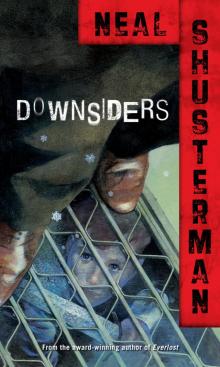 Downsiders
Downsiders The Schwa Was Here
The Schwa Was Here UnStrung
UnStrung Edison's Alley
Edison's Alley Duckling Ugly
Duckling Ugly Everlost
Everlost Dread Locks
Dread Locks Antsy Floats
Antsy Floats Full Tilt
Full Tilt Thunderhead
Thunderhead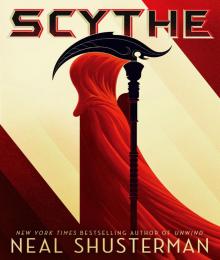 Scythe
Scythe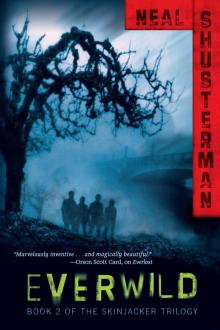 Everwild
Everwild Challenger Deep
Challenger Deep Shattered Sky
Shattered Sky Red Rider's Hood
Red Rider's Hood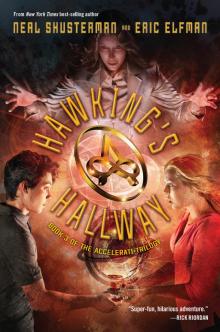 Hawking's Hallway
Hawking's Hallway Antsy Does Time
Antsy Does Time Darkness Creeping: Twenty Twisted Tales
Darkness Creeping: Twenty Twisted Tales Bruiser
Bruiser Thief of Souls
Thief of Souls The Toll
The Toll Darkness Creeping
Darkness Creeping Resurrection Bay
Resurrection Bay Thunderhead (Arc of a Scythe Book 2)
Thunderhead (Arc of a Scythe Book 2)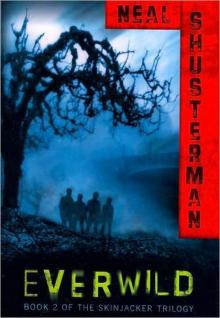 Everwild (The Skinjacker Trilogy)
Everwild (The Skinjacker Trilogy) Everfound s-3
Everfound s-3 Edison’s Alley
Edison’s Alley Everwild s-2
Everwild s-2 Dry
Dry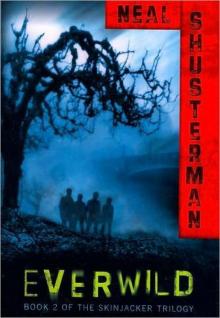 Skinjacker 02 Everwild
Skinjacker 02 Everwild Everlost s-1
Everlost s-1